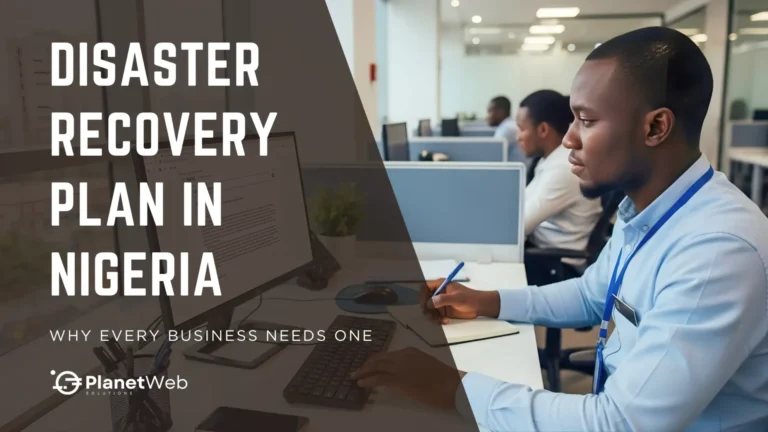NDEPS Pillars in Nigeria: Understanding the 8 Foundations of Digital Transformation
Nigeria’s digital transformation isn’t happening randomly. It’s guided by a strategic framework called the National Digital Economy Policy and Strategy (NDEPS), built on eight specific pillars.
These pillars aren’t abstract policy concepts. They’re practical frameworks driving real changes in how Nigerians access the internet, use government services, start businesses, and participate in the digital economy.
Understanding these pillars helps you see where opportunities are, what’s changing in your industry, and how to position your business for Nigeria’s digital future.
This article breaks down all eight NDEPS pillars in plain language, explains what each one actually does, and shows you why they matter for your business or career. For tracking how we’re performing against NDEPS targets, see our NDEPS progress report.
The 8 NDEPS Pillars: Overview
Before diving into details, here’s the complete framework:
- Developmental Regulation – Smart rules that enable innovation
- Digital Literacy and Skills – Training Nigerians for the digital economy
- Solid Infrastructure – Broadband, data centers, connectivity
- Service Infrastructure – Digital government services and platforms
- Digital Services Development – Supporting startups and digital businesses
- Soft Infrastructure – Cybersecurity, data protection, digital identity
- Digital Society and Emerging Tech – AI, blockchain, IoT applications
- Indigenous Content – Prioritizing Nigerian talent and solutions
Each pillar addresses specific challenges and creates specific opportunities. Let’s break them down.
Pillar 1: Developmental Regulation
What it means: Creating regulations that protect users while encouraging innovation, not blocking it.
Traditional regulation often treats new technology like old industries. NDEPS aims for a smarter approach: supervise innovation, allow controlled experimentation, and adapt rules as technology evolves.
Real Example:
The Central Bank’s regulatory sandbox allows fintech companies to test new payment solutions under supervision before obtaining full licensing. This allowed companies like Flutterwave to prove cross-border payment models work before facing full regulatory requirements.
Similarly, the Nigeria Startup Act provides legal protections for startups, tax incentives, and clearer regulatory pathways.
Why It Matters:
For Startups: Less regulatory uncertainty. Clear pathways for licensing and compliance. Room to experiment before committing massive resources.
For Businesses: Easier to adopt new technology knowing a regulatory framework exists. Faster compliance processes when rules are clear and supportive.
For Consumers: Protection from fraudulent services while still accessing innovative products. Regulators can act quickly when problems emerge.
The Challenge: Implementation varies by sector. Some agencies embrace developmental regulation. Others default to traditional restrictive approaches. Consistency remains an issue.
Pillar 2: Digital Literacy and Skills
What it means: Training Nigerians in digital skills so they can participate in and benefit from the digital economy.
Nigeria needs millions of people who can code, design, analyze data, manage digital marketing, and operate digital businesses. This pillar focuses on creating that workforce.
Real Example:
Data Science Nigeria received ₦2.8 billion in funding to train Nigerians in AI and data science. Programs like Google’s AI Fund and NITDA’s iHatch are building digital capacity nationwide.
Microsoft’s 4Afrika initiative, Andela’s training programs, and dozens of coding bootcamps are producing developers, designers, and digital professionals.
Current Status:
Nigeria’s digital literacy rate sits around 45-50%. NDEPS set a target to train 5 million Nigerians in digital skills. We’re making progress but tracking remains incomplete.
Why It Matters:
For Job Seekers: Digital skills open access to remote work opportunities paying global rates. Nigerian developers can earn $30,000-$100,000+ annually working remotely for international companies.
For Entrepreneurs: More skilled talent is available locally. Easier to find developers, designers, and digital marketers without looking abroad.
For Businesses: Can hire digitally skilled employees without massive training investment. Your team can adopt new tools and platforms faster.
The Opportunity: Digital transformation in Nigeria requires skilled professionals. Getting trained now positions you for high-demand, well-paying opportunities.
Pillar 3: Solid Infrastructure
What it means: Building the physical infrastructure that makes the digital economy possible: broadband, data centers, fiber optic cables, and reliable connectivity.
Without infrastructure, nothing else works. You can’t use digital services without the internet. You can’t build digital businesses without reliable connectivity.
Real Example:
The 2Africa submarine cable landed in Lagos in 2024, dramatically increasing Nigeria’s international bandwidth capacity. 5G networks launched in Lagos, Abuja, Port Harcourt, and other major cities.
Infraco is rolling out fiber backbone infrastructure to underserved states. Private ISPs are expanding coverage to secondary cities.
Current Status:
Nigeria’s broadband penetration stands at approximately 51-53%, short of the 70% target. Urban areas have reasonable coverage. Rural areas remain severely underserved.
Why It Matters:
For Individuals: Faster, more reliable internet means better access to education, entertainment, and work opportunities. 5G enables new use cases like AR/VR applications.
For Entrepreneurs: Reliable connectivity lets you build and run digital businesses. Cloud services, video calls, and online tools become viable for business operations.
For Businesses: Remote work becomes feasible. Cloud migration makes sense. Digital operations and collaboration tools actually work consistently.
The Reality Check: Infrastructure progress is uneven. Lagos and Abuja have good connectivity. Many other areas struggle. Factor this into business planning.
Pillar 4: Service Infrastructure
What it means: Digitizing government services so citizens can access them online instead of standing in queues at government offices.
This includes everything from passport applications to business registration, from tax filing to land registry access.
Real Example:
Services.gov.ng provides one-stop access to federal government services. You can renew passports, apply for visas, file taxes, and access other services online.
Some states have digitized land registries, tax systems, and business registration processes. Lagos State’s digital initiatives make it easier to register businesses and pay taxes.
Current Status:
Federal government services are 25-35% digitized. State governments vary wildly. Local government digitization is minimal. Many “digital” services still require in-person steps.
Why It Matters:
For Citizens: Less time wasted in government offices. Services are accessible 24/7. Reduced corruption as face-to-face interactions decrease.
For Businesses: Faster business registration, licensing, and compliance. Digital tax filing saves time. Reduced friction in dealing with the government.
For Developers: Opportunities to build solutions integrating with government APIs. Companies can automate compliance workflows and reduce manual processing.
The Gap: Implementation lags significantly. Many local governments lack the capacity or the will to digitize services. Progress at the federal level doesn’t automatically translate to state and local levels.
Pillar 5: Digital Services Development and Promotion
What it means: Supporting digital businesses, startups, and entrepreneurs with funding, regulatory clarity, and ecosystem support.
This pillar recognizes that Nigeria’s digital economy grows when entrepreneurs succeed. The government’s role is to create an enabling environment.
Real Example:
The Nigeria Startup Act provides tax incentives, funding mechanisms, and regulatory clarity for startups. Moniepoint became Nigeria’s latest unicorn in 2024, benefiting from a supportive ecosystem.
NITDA’s Startup Portal and Bank of Industry grants provide funding and advisory support for early-stage ventures. Various accelerators and incubators help startups scale.
Current Status:
A legislative framework exists, but implementation varies by state. Only 10-12 states have domesticated the Startup Act. Most support concentrates in Lagos.
Why It Matters:
For Founders: Access to funding, mentorship, and support programs. Tax incentives reduce early-stage burn rate. Clearer regulatory pathways reduce uncertainty.
For Traditional Businesses: Tools and support for digitizing operations. Easier to adopt e-commerce, digital marketing, and online services.
For Investors: A Clearer legal framework for investing in Nigerian startups. Better protection and defined exit mechanisms.
The Reality: Support exists, but access is uneven. Lagos-based startups benefit most. Regional startups struggle to access capital and support despite growing tech hubs in Abuja, Enugu, and Port Harcourt.
Pillar 6: Soft Infrastructure
What it means: Building trust in digital systems through cybersecurity, data protection, and digital identity frameworks.
People won’t use digital services if they don’t trust them. This pillar creates security and privacy foundations that enable digital economy growth.
Real Example:
The Nigeria Data Protection Act (NDPA) replaced the NDPR in 2023, giving Nigeria’s data protection commission stronger enforcement powers and clearer compliance requirements.
The National Identity Number (NIN) system links to SIM cards and bank accounts, creating a unified digital identity that simplifies KYC (Know Your Customer) processes.
Current Status:
The regulatory framework is strong. Major companies (banks, telcos, large tech firms) generally comply. Many SMEs remain non-compliant, often due to lack of awareness or resources.
Why It Matters:
For Consumers: Better protection of personal data. Clearer rights when companies misuse information. More secure digital transactions.
For Startups: Simplified KYC and user onboarding. NIN integration reduces verification time from days to minutes. But compliance costs can be significant for small companies.
For Businesses: Competitive advantage for companies that prioritize data security. Customer trust increases when you demonstrate strong data protection practices.
The Challenge: Enforcement is inconsistent. Data breaches still occur regularly. Many businesses view compliance as a cost rather than a competitive advantage. Learn more about IT solutions in Nigeria, including cybersecurity services.
Pillar 7: Digital Society and Emerging Technologies
What it means: Applying cutting-edge technologies like AI, blockchain, IoT, and other innovations to solve Nigerian problems across health, education, agriculture, and other sectors.
This pillar encourages experimentation with emerging tech and supports Nigerian developers building solutions for local and global markets.
Real Example:
FundusAI uses artificial intelligence to diagnose diabetic eye disease, a Nigerian-built solution now used internationally. Farmspeak applies AI to agricultural advisory. Rana Energy uses smart tech for clean energy solutions.
In blockchain, Nigerian crypto adoption ranks among the highest globally. Remittances, inflation hedging, and payment applications show real traction despite regulatory uncertainty.
Current Status:
Innovation exists, but scale remains limited. Most emerging tech solutions are in the pilot phase. Infrastructure constraints and regulatory uncertainty slow mass adoption.
Why It Matters:
For Developers: Opportunities to build AI applications, blockchain solutions, and IoT systems solving African problems. Nigerian solutions can scale across the continent.
For Businesses: Early adopters of AI and automation gain competitive advantages. Operational efficiency improvements from emerging tech can be significant.
For Society: Better healthcare diagnosis, improved agricultural yields, more efficient energy use, and enhanced education delivery through technology.
The Reality: Emerging tech shows promise but faces adoption challenges. Infrastructure gaps limit deployment. Regulatory clarity (especially for blockchain) remains incomplete.
Pillar 8: Indigenous Content Development and Adoption
What it means: Prioritizing Nigerian talent, products, and solutions in technology development and government procurement.
Instead of defaulting to foreign solutions, this pillar encourages developing and using locally-built technology that keeps money in Nigeria and builds local capacity.
Real Example:
Executive Orders 003 and 005 mandate government agencies to prioritize Nigerian content in procurement, including technology platforms and solutions.
Some states, like Enugu, have implemented smart school programs and digital hubs using local solutions. Nigerian software companies increasingly win government contracts.
Current Status:
Policy exists, but enforcement is inconsistent. Many government agencies still default to international vendors for major technology projects. There is no clear verification mechanism for local content requirements.
Why It Matters:
For Local Developers: Government-backed opportunities for Nigerian tech companies. Procurement preference creates a market for local solutions.
For Foreign Companies: Partnering with Nigerian firms becomes necessary (and smart) for accessing government contracts and building local presence.
For Economy: Keeping technology spending within Nigeria builds local industry, creates jobs, and develops expertise that can compete globally.
The Challenge: “Local content” definitions remain vague. Enforcement mechanisms are weak. International vendors often structure deals to technically comply while still dominating.
How the Pillars Work Together
These eight pillars aren’t independent. They reinforce each other.
Solid infrastructure enables digital services. Digital literacy creates a workforce that builds digital businesses. Developmental regulation allows innovation while soft infrastructure builds trust. Service infrastructure demonstrates the government’s commitment to encouraging private investment.
When all pillars advance together, Nigeria’s digital economy accelerates. When some lag (like infrastructure or service infrastructure), it constrains progress across other areas.
For detailed tracking of how Nigeria is performing on each pillar, see our NDEPS progress report.
What This Means for Your Business
If You’re Starting a Business
Align with the pillars. Businesses solving infrastructure gaps, providing digital skills training, building emerging tech solutions, or helping companies digitize operations align with national priorities and may access support programs.
Watch regulatory developments. Developmental regulation creates opportunities in fintech, healthtech, edtech, and other regulated sectors. Being early in spaces with regulatory clarity provides first-mover advantages.
Built for the Nigerian context. Solutions that work elsewhere need adaptation. Infrastructure constraints, payment preferences, and user literacy levels differ from developed markets.
If You’re Running an Existing Business
Digital transformation isn’t optional. Service infrastructure and digital services pillars signal a government push toward digital. Your customers and competitors are moving online.
Invest in your team’s digital skills. The digital literacy pillar creates training opportunities. Upskilling existing staff often works better than hiring.
Consider data protection compliance a competitive advantage. The soft infrastructure pillar eventually makes compliance mandatory. Early adopters build trust and avoid future scrambling.
If You’re a Developer or Tech Professional
Specialize in pillar-relevant areas. Skills in cybersecurity, AI, digital identity systems, government digital services, and emerging tech align with national priorities and command premium rates.
Consider remote work opportunities. Digital literacy and skills development create pathways to global opportunities while living in Nigeria.
Build solutions for underserved pillars. Infrastructure gaps, service infrastructure needs, and indigenous content preferences create market opportunities.
Frequently Asked Questions
Related Reading
- NDEPS Progress in Nigeria: Tracking Digital Economy Targets
- Nigeria Digital Economy: Market Overview and Opportunities
- Digital Transformation in Nigeria: What’s Working and What’s Not
- Navigating the Nigeria Data Protection Act 2023
- The Future of IT Solutions in Nigeria
Stay Informed on Nigeria’s Digital Transformation
At PlanetWeb, we track Nigeria’s digital economy development, analyze the progress of NDEPS pillars, and explain what these changes mean for businesses and entrepreneurs.
✔ Share this guide with anyone navigating Nigeria’s digital transformation
✔ Subscribe to our newsletter for ongoing NDEPS updates and analysis
✔ Follow us on LinkedIn or X
Which NDEPS pillar matters most for your business? Share your thoughts in the comments.






